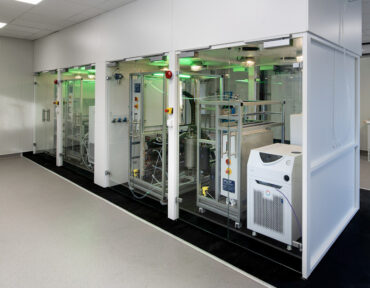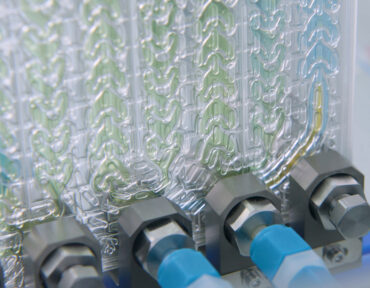The Advantages of Our Flow Chemistry Services
Continuous manufacturing, and in particular flow chemistry, remains a highly attractive technology option for pharmaceutical and biotech innovators.
Although slightly more expensive upfront costs are required to establish the methodology, the long-term savings from reduced manufacturing costs and eliminated scale-up and development cycles, as well as greater scale and manufacturing flexibility, can far outweigh larger starting costs.
The inherent de-risking potential of this technology therefore offers not only significant cost-saving advantages, but also serves as a valuable strategy for mitigating risks in your operations.

Centre of Excellence in Flow Chemistry
At our Centre of Excellence in Flow Chemistry we bring together our brightest minds to solve your synthetic challenges utilizing the Flow Chemistry Tool Box.
With a well-equipped R&D laboratory and fully capable pilot manufacturing facility, we can not only solve the chemistry challenges but also demonstrate the solution at a small production scale (10’s of kg).
Benefits include:
- Enhanced safety profile
- Scalability
- Reduced capital expenditure
- Flexible investment
- Environmental profile & green chemistry
- Project timeline reductions

What is Flow Chemistry & How Does It Work?
In its simplest form, flow chemistry is the process of pumping two reactive components together at a junction so they can react downstream in a temperature-controlled tube continuously.
This differs fundamentally from batch chemistry, where the two reactants are fed into a reactor at the start of the reaction, with the final product being extracted once the entire reaction is complete.
The major advantage of Flow Chemistry in a tubular reactor is the vastly improved heat transfer and mixing that is achieved, leading to overall better control.
Due to the small volume of the tubular reactor compared to that of a standard batch reactor, the surface-to-volume ratio of the flow reactor is significantly higher, which results in better heat transfer.
Thanks to this improved heat transfer and the reduced volume in a flow reactor, exothermic chemistry that would never be considered safe in a batch reactor is now considered safe.
Furthermore, chemistries that have never proven successful in batch mode may become applicable in flow chemistry, such as electrochemistry or photochemistry.
Want to find out more?
Get in touch with our team of experts to explore bespoke end-to-end CDMO support of your complete drug lifecycle
at any scale.